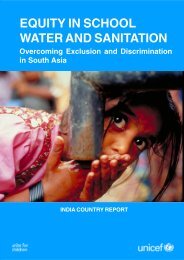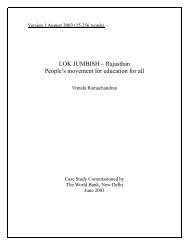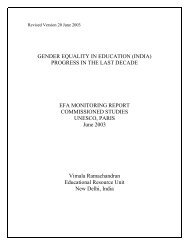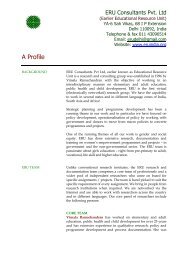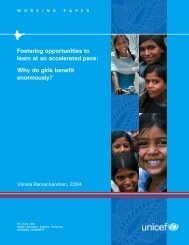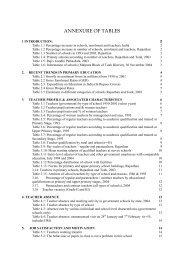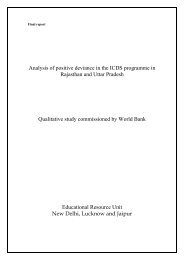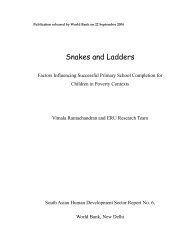primary school teachers the twists and turns of everyday practice
primary school teachers the twists and turns of everyday practice
primary school teachers the twists and turns of everyday practice
You also want an ePaper? Increase the reach of your titles
YUMPU automatically turns print PDFs into web optimized ePapers that Google loves.
Version 20 Oct 08, edited final<br />
- The teacher to report in a monthly peer group meeting (SKP, S<strong>and</strong>han <strong>and</strong> SKP-<br />
Board) on what she has taught, <strong>the</strong> problems she faced <strong>and</strong> what support she<br />
needed;<br />
- Anyone who went to <strong>the</strong> <strong>school</strong> (even an inspector) had to ‘give’ something—<br />
activity/lesson etc.; <strong>and</strong><br />
- The training process would weave toge<strong>the</strong>r experiential, emotional <strong>and</strong><br />
conceptual aspects <strong>of</strong> teaching.<br />
The lifeline <strong>of</strong> SKP was <strong>the</strong> selection, education <strong>and</strong> training <strong>of</strong> <strong>the</strong> SK. The first step<br />
was to identify remote <strong>and</strong> backward villages where <strong>primary</strong> <strong>school</strong>s were not<br />
functioning. The next step was to inform <strong>the</strong> concerned Panchayat Samiti about <strong>the</strong><br />
SKP. After <strong>the</strong> members <strong>and</strong> o<strong>the</strong>r elders were fully convinced <strong>of</strong> <strong>the</strong> importance <strong>of</strong><br />
education for <strong>the</strong>ir children, a meeting was called <strong>of</strong> all educated young people<br />
between 18 <strong>and</strong> 33 years <strong>of</strong> age in those villages. A minimum level <strong>of</strong> 8th st<strong>and</strong>ard<br />
was fixed for men <strong>and</strong> 5th st<strong>and</strong>ard for women. Interviews were held informally to<br />
begin with. Later all c<strong>and</strong>idates had to take tests in writing <strong>and</strong> oral skills in Hindi,<br />
h<strong>and</strong>writing, knowledge <strong>of</strong> numbers <strong>and</strong> <strong>the</strong> basic processes, cleanliness, hygiene<br />
<strong>and</strong> <strong>the</strong> environment were also tested.<br />
Of <strong>the</strong> o<strong>the</strong>r criteria for selection <strong>of</strong> SKs, <strong>the</strong> following were important:<br />
- A positive attitude towards children;<br />
- Excitement about a new chance to learn <strong>and</strong> to be a teacher; <strong>and</strong><br />
- High energy levels.<br />
The most significant contribution <strong>of</strong> SKP was <strong>the</strong> training process. The initial training<br />
module lasted up to 50 days, supplemented by recurrent <strong>and</strong> advanced training<br />
programmes for 10 days every winter <strong>and</strong> 20-30 days every summer. In addition, <strong>the</strong><br />
programme organised remedial training camps for weaker Shiksha Karmis. This was<br />
as important as <strong>the</strong> formal interactions <strong>and</strong> extension <strong>of</strong> support through Shiksha<br />
Sahayogis. The trainers were drawn from <strong>the</strong> existing pool <strong>of</strong> <strong>teachers</strong>, outside<br />
specialists from NGOs <strong>and</strong> DIETs <strong>and</strong> also senior Shiksha Karmis. To meet <strong>the</strong> goal<br />
<strong>of</strong> one male <strong>and</strong> one female SK in every SK <strong>school</strong> (<strong>the</strong> proportion <strong>of</strong> female Shiksha<br />
Karmis is currently around 12 per cent), <strong>the</strong> programme also set up Mahila<br />
Prashikshan Kendras (13) which trained 349 women as Shiksha Karmis. In addition<br />
<strong>the</strong> programme also trained members <strong>of</strong> VECs, both to help with <strong>school</strong> mapping<br />
exercises <strong>and</strong> to oversee <strong>the</strong> effective functioning <strong>of</strong> <strong>the</strong> SK <strong>school</strong>s, primarily in<br />
association with <strong>the</strong> Lok Jumbish project.<br />
Shiksha Karmi<br />
Master Trainers<br />
Table 3.2: Training cycle in Shiksha Karmi Project<br />
37 days Induction Training (earlier 37 days or 50 days<br />
depending on <strong>the</strong> model being used—S<strong>and</strong>han or Sankalp)<br />
30 days First Training<br />
30 days Second Training<br />
20 days training after two years<br />
20 days training after two years<br />
20 day Refresher Course in year five, six, seven <strong>and</strong> eight<br />
2 days monthly review, planning <strong>and</strong> difficulty removal<br />
meetings<br />
After eight years, a SK becomes a Senior SK <strong>and</strong> can also<br />
become a Master Trainer<br />
In addition to <strong>the</strong> above—SKs selected as Master Trainers<br />
undergo 26 days <strong>of</strong> MT Training<br />
35



